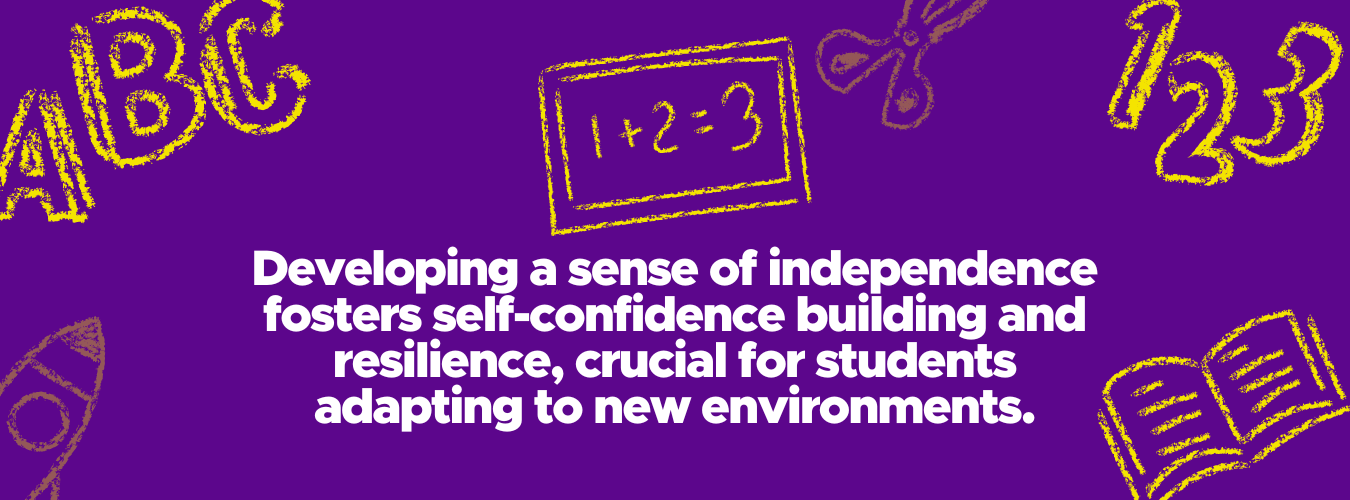Tips for Adjusting to a New School

Embarking on a journey at a different school can evoke anxiety, even in the most self-assured and resilient children. It's common for kids to feel a mix of nervousness and excitement when transitioning to a new school or advancing to a higher grade level.
Whether your family has relocated, prompting a change in your children's school, or your child is moving on to the next academic year in a different school, these tips for adjusting to a new school environment can be helpful.
During the initial week of this transition, it's essential to create an environment where your child feels comfortable and confident in their ability to adapt to the new school setting. With the right support, your child will soon find themselves feeling at home in their new school!
Foster Open Communication
Encourage your child to express their thoughts and emotions openly about the new school. Cultivate a safe environment where they feel at ease sharing both concerns and excitement. Regularly check in on their day, interactions with peers, and any challenges they may face. Open communication ensures you are well informed about their experiences and allows for prompt resolution of any issues.
If your child is hesitant to communicate verbally, consider introducing creative methods like drawing or journaling to facilitate self-expression. Additionally, establish a communication channel with both your child and their teachers to stay informed about academic progress and social dynamics in the classroom. This collaborative approach ensures a thorough understanding of your child's school experience.

Prepare Well
To increase your child's likelihood of adjusting seamlessly to their new school, help them with thorough preparation. This includes becoming familiar with the school layout beforehand and navigating the route to school.
Make sure to allocate sufficient time for the journey on the first day to alleviate any concerns about arriving late. The night before is pivotal for getting ready for the new school day. Ensure that the entire family is well-rested, lunches are packed, uniforms are prepared, and a nutritious breakfast is planned for the morning. The importance of adequate sleep and a wholesome meal cannot be overstated in ensuring readiness for the significant day of starting school!
Combat Anxiety
If your child is uneasy about starting at a new school, pinpoint the source of their apprehension and help them discover ways to relax. Anxiety often diminishes through thorough preparation, so make sure your child has all the necessary school supplies and a clear understanding of what to expect on their first day.
Developing a daily plan or having a class timetable can be effective in alleviating nerves. Introducing your child to new classmates, familiarising them with classroom locations and teacher names, and providing a means for graduate students to contact you if needed can further contribute to easing their anxiety.
Preparation fosters confidence in children, making them more comfortable with the idea of making new friends and adapting to their new school environment. Stay in regular communication with your child about their feelings, and if school-related anxiety persists, reaching out to their teacher can be an initial step toward finding solutions.

Make your Child Feel Comfortable
Adapting to a new school is a gradual process that requires time. Your child may face various challenges, such as catching a bus for the first time, parting ways with old friends, exploring new subjects, or even tackling exams. On their first day, if possible, accompany them to school. Depending on their age, consider entering their classroom to meet the teacher.
This initial interaction provides an excellent opportunity to share crucial information about your child with the teacher and establish a communication channel for ongoing dialogue. Having a convenient means of contacting your child's teacher not only enhances your comfort but also streamlines the adjustment process for both the teacher and your child in the school environment. Taking an active role in assisting both the teachers and your child in settling into the new school contributes significantly to putting both parties at ease.
Set a Routine
Establishing routines contributes to a more streamlined life. With a clear understanding of our daily activities, we can prepare effectively, addressing challenges and tasks methodically. Implementing a daily routine for your children promotes effective time management and provides clarity regarding their daily commitments.
Crafting a routine for this school year should include key elements such as wake-up time, breakfast time, the journey to school, after-school activities, designated break periods, the return journey from school, homework time, and bedtime.
Customise the routine to accommodate the significant activities of other children in the household, whether it involves catching the bus to school, engaging in football practice, or attending after-school tutoring. To help your children keep track of their time and preferred activities, consider creating a whiteboard timetable or printing out a calendar outlining your family's weekly routine.

Celebrate Achievements
Acknowledge and celebrate your child's achievements, no matter how small. Recognising their efforts and successes, whether in academics, social interactions, extracurricular programmes, or community activities, boosts their self-esteem and motivates them to adapt positively to the new school environment.
Create a system of rewards or special treats to commend children for achieving specific goals or overcoming challenges. By highlighting their accomplishments, you not only reinforce the development of their skills but also cultivate a positive mindset, assisting them in building resilience in the face of new experiences.
Encourage Independence
Empower your child to take charge of their journey in the new school. Encourage them to organise their school supplies, manage their schedule, and assume responsibility for their homework. Fostering a sense of independence is crucial in building self-confidence and resilience, essential qualities for students adapting to unfamiliar environments.
Gradually increasing their responsibilities will prepare them for the challenges of a more independent academic life. This could involve letting students independently organise their backpacks, encouraging them to plan their study schedules, or facilitating direct communication between students and teachers when necessary.

Get Involved in Extracurricular Activities
Engaging in a club or sports team offers your child an excellent opportunity to meet and connect with new people. Building friendships beyond the classroom not only broadens their social circle but may also reveal new interests or talents! Ensure you obtain the school handbook and sit down with your child to explore the various options for extracurricular activities.
Whether they're interested in learning an instrument and joining the school orchestra or inclined towards athletics, encourage them to step outside their comfort zone and join a club or team. Additionally, review the school calendar to identify upcoming classes, programmes, and events hosted by the school, faculty, or community. If possible, attend some of these school or community events with your family!
Starting a new school can be daunting, but with the right preparation and support, your child will take on the challenge with confidence. If you are concerned about your child’s progress at school, or they aren’t keeping up with their peers in class, get in touch with your local NumberWorks’nWords centre to book a free assessment.
Our comprehensive assessment process uncovers gaps and weaknesses in students and forms a personalised learning programme for each child. Learn more about English and maths tutoring with NumberWorks’nWords by contacting your local centre.




